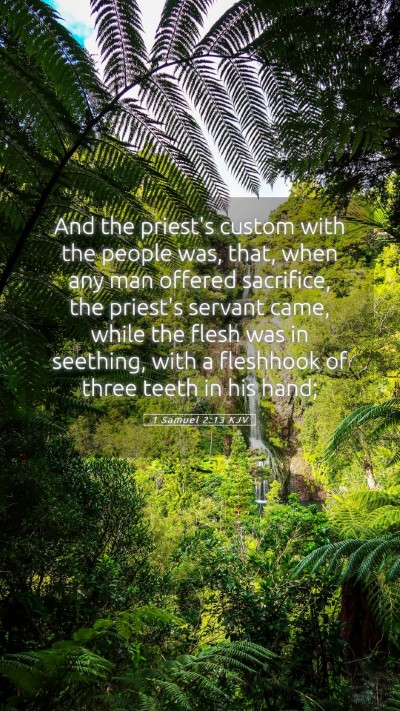Understanding 1 Samuel 2:13
Bible Verse: 1 Samuel 2:13 - "And the priests’ custom with the people was, that, when any man offered sacrifice, the priest’s servant came, while the flesh was in seething, with a fleshhook of three teeth in his hand;"
Overview of 1 Samuel 2:13
This verse provides insight into the practices of the priests during the time of Samuel, illustrating the wrongful actions and customs that were prevalent among the priests of Israel, particularly Eli's sons, Hophni and Phinehas. It highlights their avarice and corruption in the context of religious worship.
Bible Verse Meanings and Commentary
This verse is critical for understanding the attitudes and rituals of the Hebrew sacrificial system, serving as a point of reflection on the integrity and responsibilities of those serving in sacred positions.
Insights from Public Domain Commentaries
-
Matthew Henry:
Henry stresses that the rituals of the priests should be conducted with reverence and integrity. He highlights the corruption of Eli's sons, who took advantage of their positions to satisfy their greed rather than serve God faithfully. This failure illustrates a broader theme of accountability in religious service.
-
Albert Barnes:
Barnes contextualizes the actions of the priests, emphasizing that this was typical behavior in a flawed system. He draws attention to the tradition of the priest’s servant claiming parts of the sacrifice, which indicates a departure from the true intent of sacrificial offerings. This also serves as a caution against allowing personal gain to infiltrate sacred duties.
-
Adam Clarke:
Clarke provides historical context here, explaining the significance of the fleshhook and the customs surrounding sacrifices. He reflects on how these practices revealed the moral decay among the priesthood and highlighted the betrayal of the trust placed in them by the people. Clarke touches on the essential nature of dedication in worship and service to God.
Key Themes in 1 Samuel 2:13
- Corruption in Religious Leadership: This verse underscores the consequences of corrupt practices among leaders and their impact on the community's relationship with God.
- Accountability: It signals a call for those in positions of authority to uphold ethical standards in their service.
- The Importance of Worship: The manner in which sacrifices are handled reflects the overall attitude toward worship and reverence for God.
Application of 1 Samuel 2:13
Understanding this verse helps to identify personal or systemic tendencies toward corruption and selfishness in ministry today. It is a reminder that worship should always align with faithfulness and devotion to God's commands.
Cross References
- Leviticus 7:30-34 - Discusses the rights of the priests in the sacrificial system.
- 1 Samuel 2:12 - Describes the evil behavior of Eli's sons as priests.
- Malachi 1:8 - Critiques the disrespect shown in offerings brought to God.
Final Thoughts
1 Samuel 2:13 serves as an important reminder in the study of Scripture regarding the integrity and transparency required in religious leadership. By examining this verse, individuals can gain valuable insights into their own lives and the importance of upholding righteousness in all aspects of worship.


